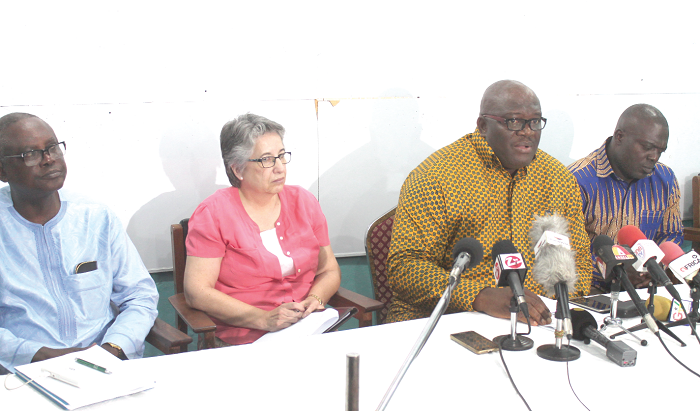
UN urges Ghana to stem build-up of small arms - In country
The United Nations (UN) Office in Ghana has urged the government to take urgent steps to deal with the proliferation of small arms and light weapons in the country.
That, it said, was necessary if the country wanted to maintain its effort to build a resilient and robust economy to propel national development.
A national small arms baseline survey conducted in 2015 established that 2.3 million small arms were circulating in the country illegally, while a similar research in 2004 established that there were 240,000 guns in circulation that year.
At a media interaction in Accra yesterday to climax the 2017 Global Week of Action against Gun Violence, the UN Resident Coordinator, Ms Christine Evans-Klock, said conflicts in some parts of the country and the heightened sense of insecurity in some West African countries had dire consequences on prospects for development.
Week of Action
The Week of Action is a platform to highlight the global campaign to stop the proliferation and misuse of small arms and light weapons.
The 2017 commemoration was held on the theme: “The road to development and peace begins with silencing the guns.”
Ms Evans-Klock said records at the Criminal Investigations Department (CID) of the Ghana Police Service had indicated that the illicit small arms and light weapons in circulation were the main weapons used in conflicts over chieftaincy, land and other forms of disputes in the country.
“And there is a new concern over their use in the politically related vigilantism that we have seen since the December election,” she said.
Describing the menace as a global phenomenon, she commended Ghana for adopting measures to silence the gun.
“I would mention, for example, the 32-day gun amnesty adopted in 2016 which granted a window of opportunity to persons in possession of unlicensed small arms to either register them or turn them in voluntarily without legal penalties,” she said.
Ms Evans-Klock also commended the national awareness raising initiatives spearheaded by the Small Arms Commission.
Ghana committed
For his part, the Deputy Minister of the Interior, Mr Henry Quartey, said Ghana was committed to the implementation of the Arms Trade Treaty (ATT) and other Sustainable Development Goals (SDGs) and all international and national instruments on the proliferation of small arms.
“These instruments and treaties, we believe, will help deal with gun violence issues in the country,” he said.
He acknowledged the fact that the time to end the proliferation of small arms and light weapons in the country was now, as it put everybody at risk.
When asked what the government intended to do to address the porous nature of the country’s borders, which was facilitating and compounding the menace of the proliferation of small arms and light weapons in the country, Mr Quartey was of the opinion that although Ghana was committed to the Economic Community of West African States (ECOWAS) policy on free trade in the sub-region, the state also had a greater responsibility to protect its citizens, which he said the government would do without compromise.
Background
In 2015, it was estimated that about 2.3 million guns were in civilian hands, according to the Kofi Annan International Peacekeeping Training Centre in Accra. The figure has been described as an 850 per cent increase over the 2004 figure of 24,000.
In Ghana, the proliferation of illicit small arms and light weapons has been reported to be facilitating and compounding the already troubling pockets of violence premised on political, royal, religious, and ethnic disagreements, among other reasons.
As part of the effort to clamp down on the menace, the National Commission on Small Arms and Light Weapons, under the auspices of the Ministry of the Interior and in collaboration with the Ghana Armed Forces and the Ghana Police Service, seized and destroyed 1,319 illicit small arms during a weapons destruction programme to commemorate the UN International Small Arms Destruction Day in 2016.
Gun amnesty
Again, the government, on August 22, 2016, declared a 32-day amnesty for all persons in possession of illegal and unlicensed weapons to register, renew or surrender them to the state.
The amnesty was extended for one month after its expiry and resulted in the retrieval of 610 guns then illegally in the possession of some people.
Additionally, 1,186 guns with expired registration were willingly tendered in for renewal by their owners, while 1,796 guns were willingly submitted to the police by their owners for registration during the 32-day national exercise.